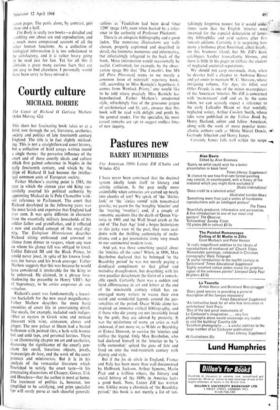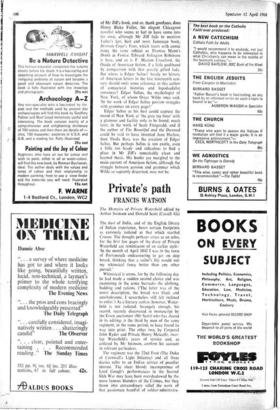Pastures new
BARRY HUMPHRIES The American 1890s Larzer Ziff (Chatto and Windus 42s)
I have never been convinced that the decimal system ideally lends itself to literary and artistic criticism. Is the past really more assimilable when centuries are carved up neatly into chunks of ten? We speak of `the 'thirties look' or `the 'sixties sound' with nonsensical gravity; we yearn for the 'naughty 'nineties' and the 'roaring 'twenties'; and, if a couple of romantic accidents like the death of Queen Vic- toria in 1901 and the Wall Street crash at the end of `The Jazz Age' lend a bogus historicism to this jerky view of the past, they were acci- dents with the thrilling authenticity of melo- drama and a pat journalistic irony very much to our sentimental modern taste.
And yet, was there something special about the 'nineties all the same? When, in 1896, Max Beerbohm declared that he belonged 'to the Beardsley period' he was not merely paying a dandiacal compliment to that gifted and maladive draughtsman, but describing with his own peculiar detachment the Geist of a remark- able epoch. Certainly there was a sudden and lurid efflorescence in art and letters at the end of the nineteenth century which has en- couraged many writers to weave their own weird and wonderful legends around the per- sonalities of the period. Oscar Wilde alone has inspired an immense critical bibliography, and if those who die young are not invariably loved by the gods, they are adored by posterity. It was the misfortune of many an artist as well endowed, if not more so, as Wilde or Beardsley or Ernest Dowson, to survive the 'nineties and outlive the legend. Only Max Beerbohm, who had declared himself in the 'nineties to be `a trifle outmoded,' spiked the guns of fate and lived on into the mid-twentieth century with dignity and style.
But if the fin de siecle in England, France and Italy has been more than well documented by Holbrook Jackson, Arthur Symons, Mario Praz and a krillion others, the literary and social history of the 1890s in America lacks a good book. Now, Larzer Ziff has written one. Unlike many a chronicle of `the Beardsley period,' this book is not merely a list of tan- talisingly forgotten names; for it would sore='' times seem that the English 'nineties were invented for the especial delectation of latter- . day bibliophiles and avid seekers after first (uncut) editions. Certainly it is surprising how many a hothouse plant flourished, albeit briefly. on this brumous island; but Mr Ziff's book catalogues hardier transatlantic blooms, and there is little in his pages to titillate the student of neglected auctorial reputations.
We should not carp overmuch, then, when he devotes half a chapter to Ambrose Bierce and yet omits to mention W. C. Morrow, whose intriguing volume, The Ape, the Idiot, and Other People, is one of the minor masterpieces of the American 'nineties. Mr Ziff is concerned with 'mainstream' stuff and so, by the same token, We can scarcely expect a reference to the early Lafcadio Hearn or that woefully neglected writer, Arthur Cosslett Smith, whose tales were published in the Yellow Book by Henry Harland, editor and fellow American, along with the work of more popular trans- atlantic authors such as Menie Muriel Dowie, 'di' •
Gertrude Atherton and Henry James.
Certainly James falls well within the scope. of Mr Ziff's book, and so, thank goodness, does Henry Blake Fuller, the elegant Chicagoan novelist who seems at last to have come into his own; although Mr Ziff fails to mention Fuller's last, best and most Jamesean book, Bertram Cope's Year, which treats with comic irony the same subject as Thomas Mann's Death in Venice. Edward Arlington Robinson is here, and so is F. Marion Crawford, the Ouida of American fiction, if a little pudibund by comparison with that greatly gifted lady. But where is Edgar Saltus? Surely no history of American letters in the late nineteenth cen- tury should omit some reference to this author of conjectural histories and logodaedalist romances? Edgar Saltus, the mythologist of New York, of whom Oscar Wilde once said, `In the work of Edgar Saltus paision struggles with grammar on every page!'
Edgar Saltus at his best could capture the mood of New York at 'the grey tea hour' with a glamour and facility only to be found, much later, in the work of Scott Fitzgerald; and if the author of The Beautiful and the Damned could be said to have invented Jean Harlow, then Theda Bara was the creation of Edgar Saltus. But perhaps Saltus is too exotic, even a little too heady and ridiculous to find a place in Mr Ziff's remarkably clean and learned thesis. His books are marginal to the main current of American fiction, although the struggle between passion and grammar which Wilde so sapiently discerned, may not be.











































 Previous page
Previous page